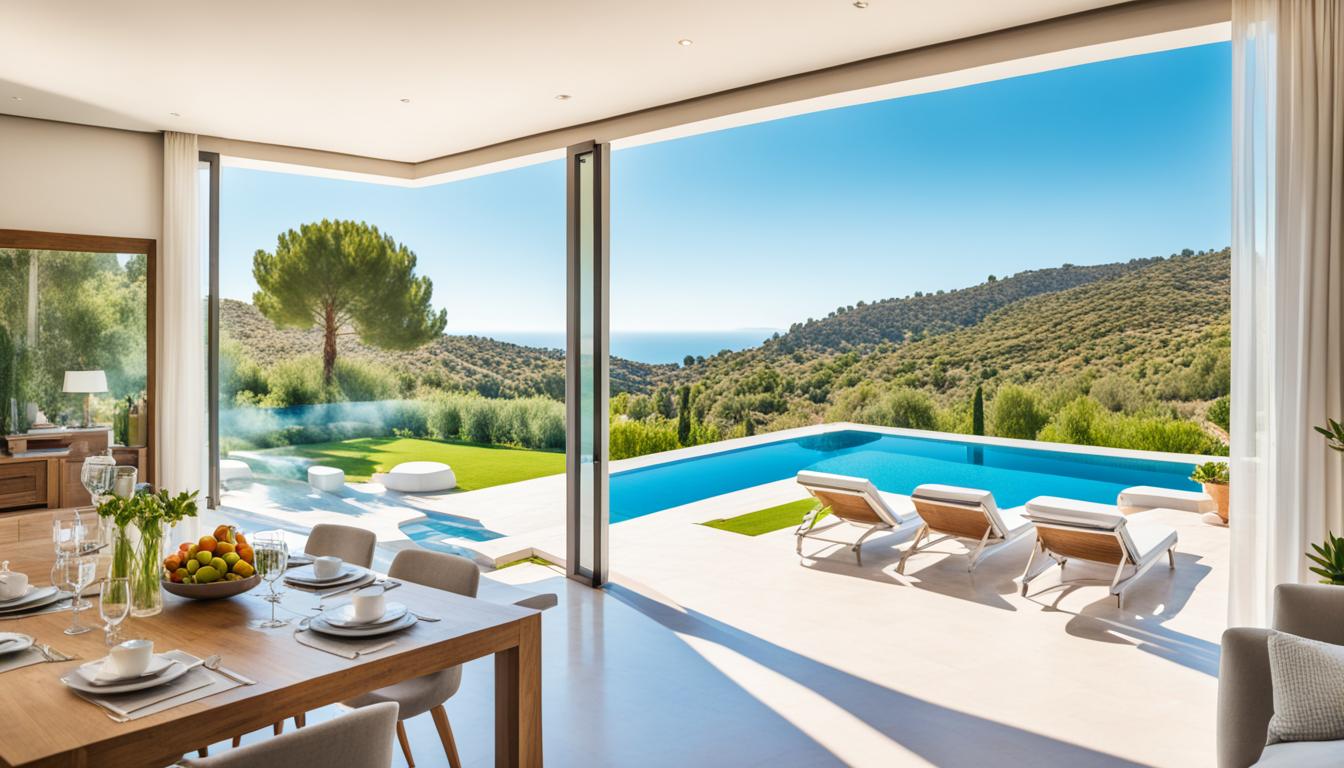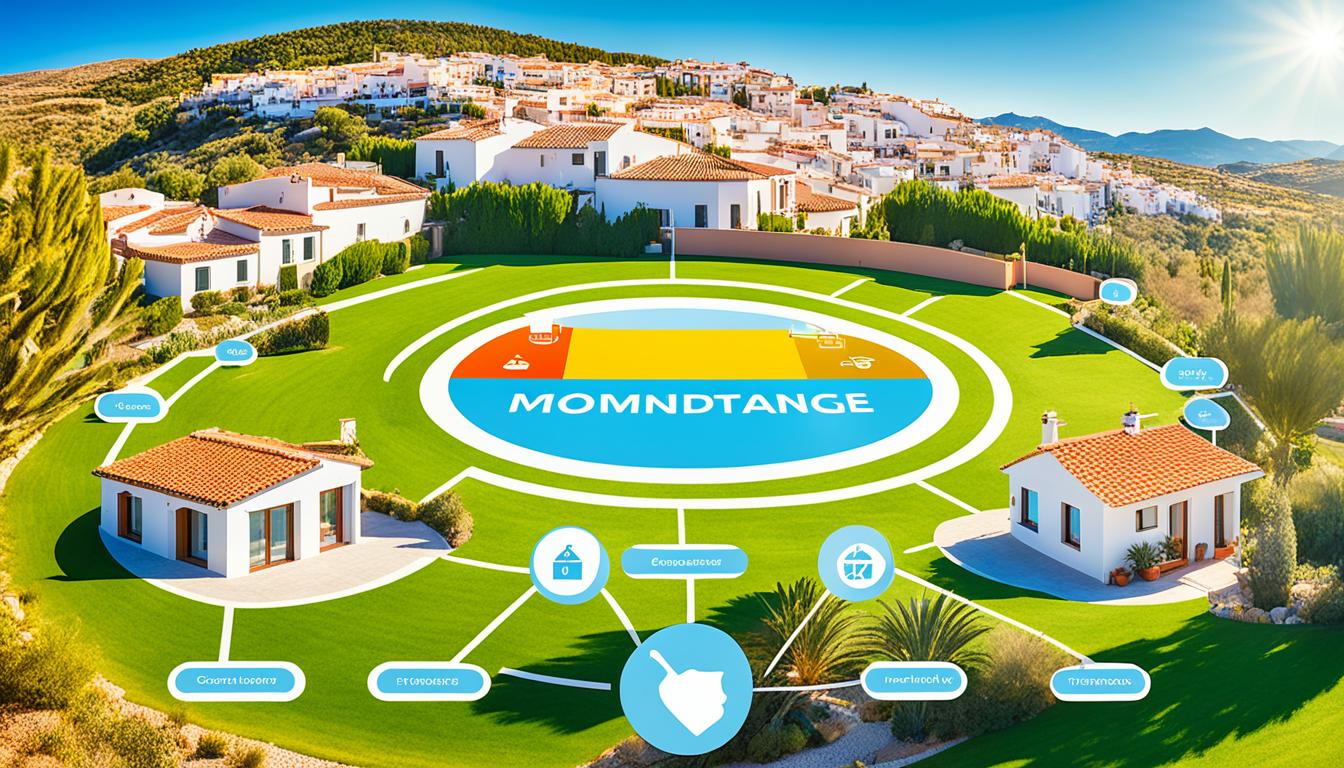The Ultimate Guide to Buying a Villa in Spain
Did you know that despite the turbulent events of 2020, Spain has seen an increase in real estate transactions by non-resident foreign buyers, with a particular interest in luxury Spanish villas? This surge reveals not only the resilience but also the growing allure of purchasing property in Spain as a form of real estate investment. With our fascination for the sun-kissed shores and the flamenco rhythm of life, we're here to guide you on the journey of buying a villa in Spain.
Whether you're captivated by the rustic charm of the Spanish countryside or the opulent villas perched along the Costa del Sol, the Spanish villa market is ripe with opportunity. From the bustling streets of Barcelona to the serene beaches of Mallorca, a Spanish villa for sale awaits your arrival. Join us as we navigate the nuances of the Spanish property market, from understanding local regulations to securing that dream investment under the Mediterranean sun.

Bearing in mind the importance of meticulous research, we recognize the diversity within the Spanish real estate sector. Knowing where to look, what to look for, and the legalities involved, are key components of a successful acquisition. Embarking on the venture of purchasing property in Spain, especially for non-native buyers, can be intricate, and it's crucial to have a reliable source of information to aid in making an informed decision. So let your real estate investment in Spain start here, with a treasure trove of insights and expertise.
Key Takeaways
- The allure of buying a villa in Spain remains strong despite recent global challenges.
- Understanding the various local regulations and market trends across Spain is crucial for buyers.
- Structuring your finances and accounting for extra costs are key steps in purchasing a villa.
- Working with knowledgeable real estate agents is essential for navigating the Spanish property market.
- It's important to leverage modern technology for property search while exercising due diligence in all transactions.
- Spain presents unique investment opportunities like the Golden Visa Program for non-EU property investors.
Understanding the Spanish Property Market
As connoisseurs of the sprawling property market in Spain, we've observed that it’s essential to grasp the nuances of regional variations and the economic climate that governs the luxury villas in Spain. This intricate market presents an array of opportunities, particularly for those eyeing Spanish property for sale. With a legacy of high homeownership—standing at about 80%—Spain boasts a robust allure for property investors and those desiring a sun-drenched abode.
In the pulsing hearts of cities like Barcelona, Madrid, and the lush landscapes of San Sebastian, property prices have witnessed a steady upswing. This trend signifies the enduring desirability of these locales, yet while Madrid claims the crown for the priciest plots, regions like Castilla y Leon emerge as bastions of affordability, presenting a spectrum of investment opportunities.
One cannot overstate the significance of acknowledging the property market in Spain's regional intricacies. Beyond the apparent allure of sun-kissed beaches and historic cities, regional regulations remain a vital piece of the puzzle, notably when it comes to foreign property acquisition and holiday lettings. To help you navigate this, we've distilled our insights into a table that captures the essence of Spain's diverse property landscape:
| Region | Property Price Trends | Foreign Buyer Attraction | Holiday Let Regulations |
|---|---|---|---|
| Madrid | High, steadily increasing | Very attractive for international investors | Tighter controls, registration required |
| Barcelona | Rising, popular for luxury purchases | High demand among Europeans | Regulations on short-term lets, permits mandatory |
| San Sebastian | Notable increases, sought-after location | Lifestyle purchasers, second-home buyers | Strict, with significant regulations |
| Castilla y Leon | More affordable, stable market | Value-driven investors, those seeking tranquility | More lenient, but varies by locality |
Comprehending the tax implications further deepens your understanding of Spain's property market, where each region presents its intricate tax demands. The harmonious blend of global appeal, the warmth of Spain's environs, and our insights, position you to authenticate prospects within the vibrant tapestry of Spain's groves and coasts deftly.
Assessing the Costs Involved in Purchasing Property in Spain
When we look into buying a holiday home in Spain, the glittering allure of sun-drenched coasts and rustic villas is often front and center. However, it is the less glamorous aspect of purchase costs in Spain that can determine the feasibility and success of such a venture. Understanding the various fees, taxes, and additional costs associated with the acquisition is essential for any buyer.

Property Transfer Tax & VAT Considerations
One of the primary financial considerations when purchasing a Spanish property is the Property Transfer Tax (Impuesto sobre Transmisiones Patrimoniales, ITP), applicable to second-hand homes, which typically ranges from 6–10% depending on the autonomous community. On the other hand, when we acquire a new development, a Value Added Tax (VAT or IVA in Spain) is levied, usually at 10%. This substantial cost underscores the importance of calculating tax implications before committing to a property.
Notary Costs, Title Deed Tax, and Legal Fees
Besides taxes, there are the notary costs, title deed tax (Actos Jurídicos Documentados, AJD), and the mandatory land registration fee. These expenses are generally proportional, amassing to about 1–2.5% of the property price. Additionally, enlisting a lawyer's services, which we highly recommend for due diligence, will incur legal fees amounting to roughly 1–2% of the purchase price, including VAT.
Estimating Additional Expenses for Buyers
We must also consider the estate agent's commission, an oft-overlooked expense by buyers. Even though traditionally in Spain, this fee, usually around 3% of the sale price, is paid by the seller, it can influence the overall asking price of the property and, as a result, the total cost to us. Awareness and careful estimation of all these ancillary costs are paramount to a seamless transaction and the ensuing enjoyment of our Spanish abode.
It's crucial we approach the process of buying a holiday home in Spain with a comprehensive budget that encompasses not only the property's price but all the purchase costs in Spain. This foresight ensures financial preparedness and sustains the excitement of owing a little corner of Spanish paradise.
Securing Financing for Your Real Estate Investment in Spain
Embarking on the journey to buy villa Costa del Sol or embark on buying property in Mallorca unveils a magnitude of options and considerations, especially when orchestrating the financial aspects of such an enterprise. As we aim to guide you through the intricacies of securing a mortgage in Spain, we understand the paramount importance of aligning your real estate acquisition with robust financing strategies.
Non-residents looking to invest in Spain's coveted real estate hotspots must be prepared for potentially elevated down payment requirements. Loan-to-value (LTV) ratios for non-resident buyers are generally capped between 60% and 70%, marking a significant upfront commitment to securing your Mediterranean retreat.
It's crucial to engage with mortgage terms that allow for a seamless alignment with your property acquisition timeline. This translates to opting for contracts that permit the withdrawal from the agreement should your financing endeavors face unexpected turbulence. We encourage a proactive approach to ensure the property in question is free from encumbrances, as inherited debts can become an unforeseen burden.
Our collective expertise suggests the utility of mortgage brokers such as Wypo, which can facilitate a smoother navigation through Spain's financial landscapes, accommodating distinct nuances that come with overseas property investment.
| Mortgage Type | Typical LTV for Non-Residents | Notable Conditions |
|---|---|---|
| Standard Variable Rate | 60% - 70% | Interest rates adjust with market |
| Fixed Rate | 60% - 70% | Stable interest rates for term |
| Interest-Only | 60% | Lower initial payments |
In summary, our cumulative advice is to intricately scrutinize mortgage options and secure favourable loan conditions that proffer the assurance to make your Spanish villa dream a tangible reality. Whether you aspire to splendid sunsets over the Costa del Sol or the rustic charm of Mallorca, commencing the journey with solid financial groundwork will pave the way to a fruitful Spanish property investment.
Finding the Ideal Villa: Tips on Searching for Spanish Property
The quest for finding Spanish villas may seem overwhelming at first, but with an astute approach and utilization of modern resources, the path to owning your dream villa in Spain can be a smooth and enjoyable journey. We'll delve into some of the most effective strategies and considerations to empower your search.
Using Technology to Your Advantage: Top Websites for Villa Searches
In an age dominated by digital convenience, prospective villa buyers have an array of online portals at their disposal. Websites such as Idealista, Kyero, and ThinkSPAIN offer comprehensive listings that make finding villas for sale in Spain a much more straightforward endeavor. These platforms not only showcase a wide range of properties but also provide valuable insights into market trends and pricing.
Importance of Local Real Estate Agents
While technology is a potent tool, the human touch cannot be discounted. Engaging with knowledgeable Spanish real estate agents affords you local expertise and nuanced understanding of the intricacies of each region in Spain. A reputable agent can navigate the complexities of the market, providing guidance on fair pricing and the most sought-after locales.
Viewing Properties: What to Look For
There's no substitute for the tactile experience of visiting villas in person. Inspecting a property allows you to gauge not just the villa's condition but also its ambiance and surroundings, ensuring that it meets your benchmarks for comfort, style, and practicality.
When you visit properties, keep a vigilant eye on details and consider the potential hidden costs or debts that could come with your investment. To assist in this endeavor, we've outlined key factors to scrutinize during property viewings:
| Aspect | Details to Consider | Potential Red Flags |
|---|---|---|
| Structural Integrity | Quality of construction, evidence of damp or cracks | Major cracks or uneven floors |
| Maintenance | State of repair, recent renovations | Overdue maintenance or makeshift repairs |
| Legalities | Property deeds and licenses | Lack of proper documentation |
| Extras | Additional features such as pools, gardens, or outbuildings | Features in disrepair or requiring extensive work |
By being meticulous during your property hunts and engaging with reliable professionals, you can avoid the pitfalls that others might encounter. Together with the right blend of tech-savvy searches and personalized assistance from local agents, your Spanish villa awaits.
Purchase Procedures: Navigating the Buying Process in Spain
When it comes to purchasing property in Spain, understanding the step-by-step procedures is crucial for a smooth transaction. The process can be complex, and it involves several stages that potential buyers must navigate with care. As experts in the field, we've outlined the essential steps that you must follow to secure your dream Spanish villa.
Firstly, it's integral to obtain an NIE (Número de Identificación de Extranjero), which is a foreigner identification number required for property purchase in Spain. Without this, the process cannot move forward. Next, opening a Spanish bank account is advised as it simplifies transactions and the payment of taxes once you've acquired your property.
Remember, engaging a trustworthy real estate agent along with a legal advisor is a significant step. These professionals will guide you through the intricacies of Spanish property law, ensuring all due diligence is performed and any potential legal issues are addressed beforehand.
- Identification of the property and agreement on terms
- Preparation and signing of the preliminary contract (Contrato de Arras)
- Paying the deposit, usually 10% of the purchase price
- Conducting a thorough property check (due diligence)
- Finalizing the mortgage terms, if applicable
- Completion of sale with a notary present and registering the property
“Buying property in another country can present challenges, but with the right guidance and understanding of the process, your Spanish villa dream is within reach.”
Your legal advisor will also ensure that the property is free from any debts or liens and will prepare you for the costs associated with the transfer, such as taxes and notary fees. And, before the final contract is signed before a notary, ensure you have comprehensive property insurance in place to protect your new asset.
Finally, upon successful completion, you'll need to settle property taxes and register the deed with the local property registry. This will formalize your ownership and safeguard your rights to the property.
We must emphasize the importance of budgeting for all associated purchase costs, such as the property transfer tax, notary fees, and any potential renovation work required. These costs need to be factored into your overall budget to avoid any unpleasant surprises.
Following these procedures diligently and seeking the help of professionals will assist you greatly in acquiring a piece of the Spanish lifestyle. Whether you’re looking for a sunshine-soaked retreat or a savvy real estate investment in Spain, proper navigation of the buying process is key to achieving your property goals.
Buying Villa Spain: Final Steps and Settling In
After the extensive search and the meticulous process of purchasing, the journey towards owning a villa in Spain approaches its final stages. As we transition from buyers to homeowners, several crucial steps must be taken to ensure a smooth settling in. It’s not just about obtaining the keys; it’s about integrating into your new community and making your Spanish villa feel like home.
Understanding local customs and regulations is paramount as they can significantly differ from what we’re accustomed to in the UK. This includes becoming acquainted with waste collection schedules, local noise ordinances, and neighborhood associations which often have a strong presence in Spanish communities.
As we make our move, connecting utilities and setting up essential services is vital. Transitioning the billing details for electricity, water, and gas into our names and ensuring everything is functioning correctly is a top priority to avoid any disruption once we’ve moved in.
It's also fundamental that we register with local authorities. This typically involves signing on the 'padrón', the town hall's register, which is a necessity for accessing local services, from healthcare to school enrolment if you have children. Additionally, engaging with community events and joining local social media groups can be effective steps towards integration.

- Arrange a thorough cleaning session for your new villa.
- Secure property and contents insurance – a necessity in protecting your new investment.
- Meet your neighbors to foster good relations and get local insights.
- Update your address for all your correspondences and registrations.
- Explore the surrounding area to familiarize yourself with amenities like supermarkets, pharmacies, and emergency services.
Moreover, we should always remember to keep all property-related documents in an accessible yet secure location, as they often need to be presented for various administrative tasks even post-purchase.
| Task | Objective | Benefit |
|---|---|---|
| Utility Setup | Ensure continuous access to essential services | Comfort in your new home without interruptions |
| Community Engagement | Develop local networks and understand customs | Enhanced social integration and support |
| Security Measures | Protect your property investment | Peace of mind |
| Documentation Organization | Have all property-related papers at hand | Preparedness for legal and administrative matters |
Embarking on this new chapter in Spain with careful consideration of these final steps will undoubtedly pave the way towards a fulfilling life in your new Spanish villa. Whether you cherish relaxing in the idyllic weather or engaging with the vibrant community, owning property here requires attention to detail, from purchase to settling in, but the reward is an enriching lifestyle that many can only dream of.
Conclusion
Throughout our comprehensive journey, we've navigated the multifaceted landscape of purchasing a villa in Spain. From understanding the nuances of the Spanish property market to assessing the costs, securing financing, and finding the ideal property, we aim to have equipped our readers with valuable insights for a well-informed decision. The buying process in Spain offers an inviting opportunity, especially strengthened by Spain’s Golden Visa program for investors, and it is apparent why Spain continues to captivate the hearts of property seekers worldwide.
We have examined the importance of being acquainted with the various regional laws and procedures that govern villa purchases. Emphasizing diligence in every step, we succinctly highlighted the necessity to consider additional costs, the significance of partnering with local experts, and the need for a detailed property inspection. Settling into your new Spanish home should be a seamless transition, underscored by the joy of achieving a dream investment in one of the most beautiful countries in the world.
For our UK-based readers, we trust this guide serves not just as an informative outline, but as a trusty companion in your exciting journey to owning a Spanish villa. Whether you seek the vibrant shores of Costa del Sol, the serenity of Mallorca, or the exuberant city life of Barcelona or Madrid, may your pursuit be as delightful as the Spanish sunrise. Spanning from initial curiosity to the thrilling moment of holding your new villa keys, remember that each step taken is a move towards a lifestyle rich with culture, beauty, and endless possibilities.
FAQ
What makes Spain a popular choice for buying a villa?
Spain's alluring climate, beautiful landscapes, and the promise of a relaxed lifestyle make it a top choice for real estate investments. Areas like Costa del Sol, Mallorca, and cities like Barcelona and Madrid offer a diverse array of luxury villas catering to various tastes and preferences.
How has the Spanish property market recovered since the financial crisis?
The Spanish property market has been on a steady uptrend since 2016, signaling a recovery from the global financial crisis. However, the COVID-19 pandemic has led to reduced sales in 2020, injecting some level of uncertainty.
What are the benefits of Spain's Golden Visa program for property investors?
Spain's Golden Visa program offers residency to non-EU investors who invest more than £500,000 in Spanish properties. This has become a significant draw for international buyers looking for both investment opportunities and a gateway to residency in Spain.
Can you explain the regional variations in Spain's property market?
Certainly. Spain's property market varies significantly by region, with price inflations occurring in popular cities and islands. Each region has different regulations for foreign property purchases, particularly concerning holiday lets. It's essential to understand these regional nuances to make an informed investment.
What additional costs are involved in purchasing property in Spain?
Beyond the property's purchase price, buyers should budget for property transfer tax (6–10%), VAT on new properties (10%), notary fees, title deed tax, land registration fees (1–2.5%), and legal fees (~1–2%). These ancillary costs are pivotal in the overall investment calculation.
How does financing a property in Spain work for non-residents?
Non-residents may need to make higher down payments, with loan-to-value ratios typically capped at 60-70%. Mortgages from Spanish and international banks are available, some with expat-friendly terms. It's crucial for the mortgage agreement to allow withdrawal if financing isn't successful and to also check for any debts on the property.
What are some top websites for searching for villas in Spain?
Websites such as idealista.com, Kyero, and thinkSPAIN are excellent resources for villa searches, offering extensive listings with various filters to narrow down choices. They can be a great starting point when looking for the ideal Spanish villa.
How important is it to work with a local real estate agent in Spain?
Working with a local real estate agent can provide invaluable regional insights and assist with language barriers. An agent's knowledge of the local property market and regulations can help significantly, though buyers should still perform their own due diligence.
What should I look for when viewing properties in Spain?
When viewing properties, consider the property's condition, location, potential hidden costs, and any legal stipulations that might apply. It is advisable to visit in person, be guided by objective advice from a notary or legal advisor, and ensure there are no debts associated with the property.
What does the buying process in Spain involve?
The buying process typically includes legal checks, obtaining an NIE number (tax identification), and signing a preliminary contract. Following that, the purchase deed (escritura de compraventa) is signed in front of a notary, and the payment is completed. Afterward, the new ownership is registered with the local Land Registry.
Are there any considerations for settling in after purchasing a villa in Spain?
After purchasing your villa, consider practicalities such as engaging with utility providers, setting up insurance, and if applicable, understanding the management of holiday rentals. Integrating into the local community and culture is also a crucial part of settling into your new home in Spain.

